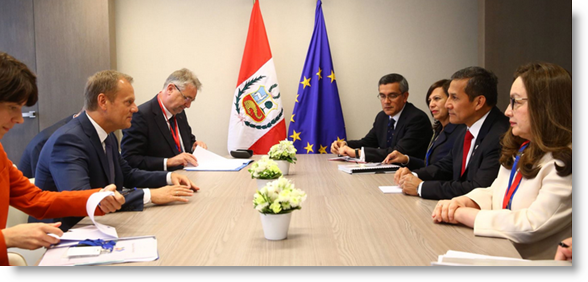
President Ollanta Humala is in Brussels this week for the EU-CELAC Summit, being held June 10 and 11.
This eighth summit between the 61 countries that form the European Union and the Latin American and Caribbean Economic Council is focused on “Shaping our common future: working for prosperous, cohesive and sustainable societies for our citizens.”
Prior to the opening sessions, Humala met with Donald Tusk, president of the European Council, for general talks on a number of topics, including the current programs in place for reducing poverty and infant chronic malnutrition. Tusk also mentioned the exemption of the Schengen visa for Peruvians travelling to Europe, which goes into effect in January 2016 and will open up possibilities not only for increased tourism to Europe but also easing educational, scientific and cultural exchanges.
EU-CELAC relations are structured around biennial summits, regular senior officials’ meetings as well as specific thematic dialogues and initiatives. These include:
- Joint Initiative on Research and Innovation, which fosters sustainability and social inclusion through a targeted focus on science, research, technology and innovation;
- EU-CELAC Structured Dialogue on Migration, which provides a framework to exchange best practices and build capacities that can help to address bi-regional migration challenges; and
- EU-CELAC Coordination and Cooperation Mechanism on Drugs, which is a policy dialogue structure that tackles the world drug problem and focuses on shared and common responsibility in this area.
CELAC, established in 2010, involves 33 countries in Latin America and the Caribbean and has merged the Rio Group, which is a political consultation forum, as well as the Latin America and Caribbean Summits organization, CALC.





